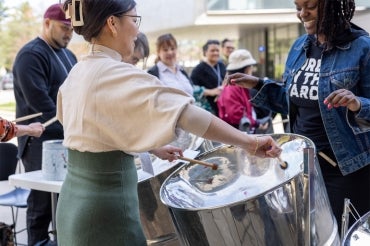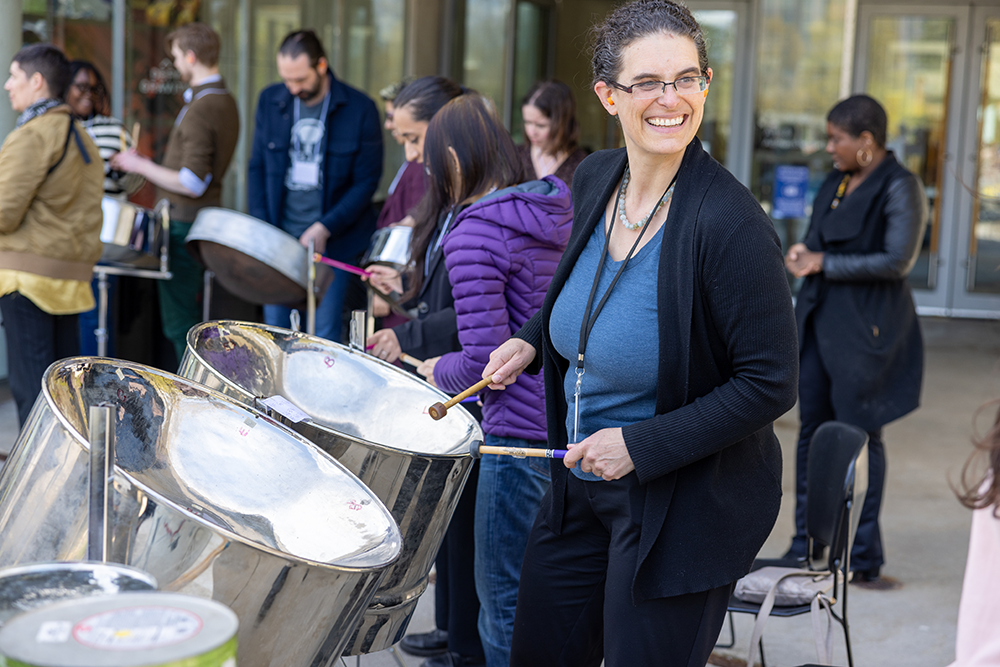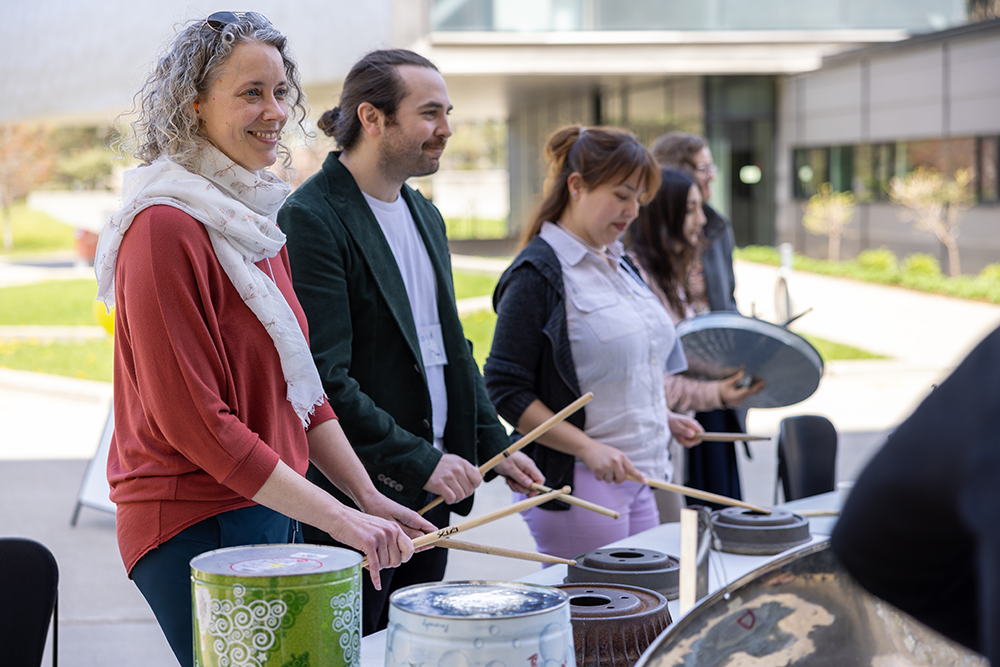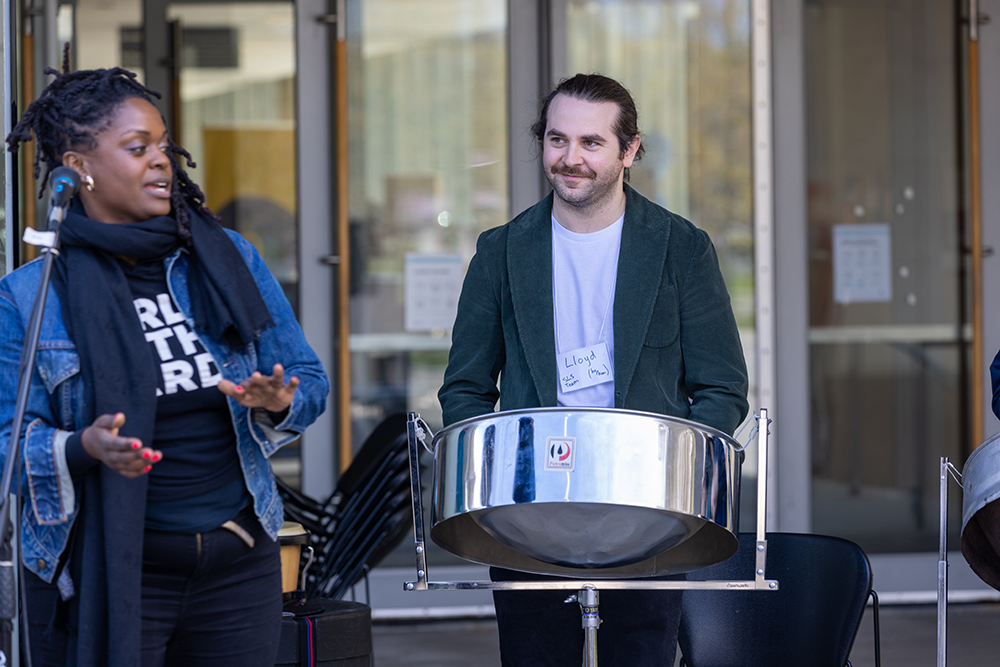U of T Scarborough launches new centre for music and community engagement

A new music centre at U of T Scarborough recently hosted its first symposium (photo by Alexa Battler)
Published: May 23, 2023
A new centre launched by the music and culture program at the University of Toronto Scarborough is removing barriers to making music – and not just for students.
Called SoundLife Scarborough (SLS), the research centre is teaming up with local organizations to create more opportunities for music-making on and off campus.
“The centre supports community partnerships and community-engaged research excellence grounded in the principle of reciprocity,” says Laura Risk, SLS co-lead and an assistant professor in U of T Scarborough’s department of arts, culture and media. “We're trying to help facilitate connections and really think about how we can contribute to the already vibrant musical world in Scarborough.”

SLS faculty member Roger Mantie calls the centre “the glue” that will hold together the music and culture program’s partnerships, initiatives, research projects and programming. Professors in the program have frequently engaged local organizations as part of their courses and research, but the centre will allow U of T Scarborough to maintain and build these relationships beyond individual courses or projects, he says.
“Now we have a hub that can create stability and sustainability,” says Mantie, an associate professor in the department of arts, culture and media. “And organizations have a point of contact beyond a singular faculty member.”
The centre will find new ways to use the university’s resources and strengths to support those pursuing their love of music. Risk says new partnerships and programming will begin with the question: “What’s in it for the community?”
“SLS is meant to be a very porous interface between the university and the community,” says Lynn Tucker, SLS lead and associate professor, teaching stream, in the department of arts, culture and media.

All programming is meant be free and accessible. It already includes pop-up and weekly music-making events for hand-drumming and ukulele, along with Brazilian Maracatu sessions with Juno-nominated master percussionist Aline Morales.
“The age range for some of those Maracatu sessions is eight to 80,” says Tucker. “We have families coming in with their kids. We've had people come in for date night. People drive up from downtown on a Thursday evening to attend.”
Music program marching to a new beat
SLS is just one of the ways the program is rethinking the ways music is studied at university. Students don’t have to audition to get into the program, and any student can join its bands, choirs, string orchestra and small ensembles – no matter their course load or field of study. The program evolved in response to students’ interests and goals. In 2015, it adopted three new areas of focus that guided what would be taught and who would teach it: community music, music and society, and music creativity and technology.
“The main thing that differentiates it from almost every other university music program in Canada is that there's no audition to get in. Different and diverse musical backgrounds are celebrated in the curriculum and you get people from all walks of life,” says SLS research associate Lloyd McArton, a PhD candidate in U of T’s Faculty of Music who is an assistant professor of music education at the University of Lethbridge. “The focuses are really special – music and technology isn't really prominent in a lot of music programs in Canada.”

The refocusing involved four new staff hires and several new courses, including ones on DJ cultures and digital music creation, as well as others that explore music’s intersection with health, movies, society and technologies. A suite of courses dedicated to community music were also introduced so students could observe and interact with local organizations’ music programming.
One of the community music courses’ culminating projects is to write a mock grant proposal for a new community music project in collaboration with an existing organization and then pitch the idea to the class and community partners. Fourth-year student and SLS research assistant Delicia Raveenthrarajan had previously acted as a teaching-artist-in-choir with Sistema Toronto, a free music program for students in underserved communities –so she proposed a new staff role dedicated to community engagement. The organization has since used her proposal to inform their systems and practices.
“It was really cool because I got to interact with them through my studies and in my professional life,” says Raveenthrarajan, who is double majoring in music and culture and mental health studies. “It's important to de-centre the university at some points so we’re going out into the community and amplifying the voices of community partners.”



